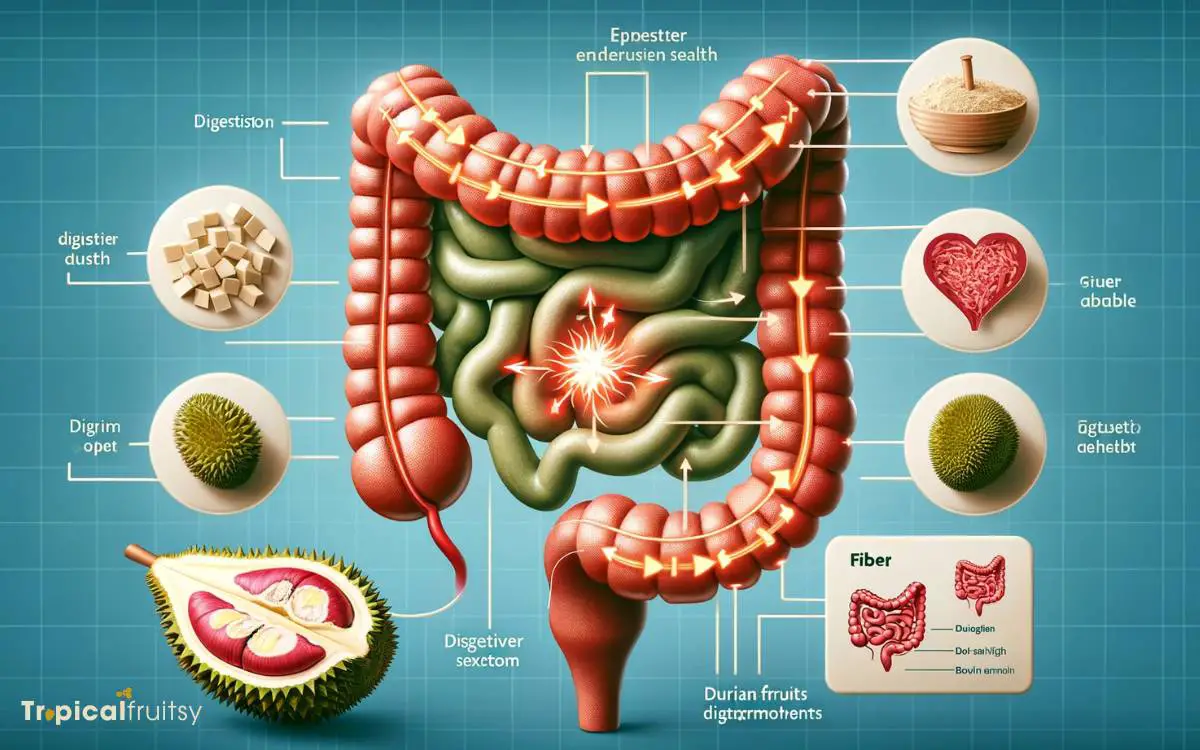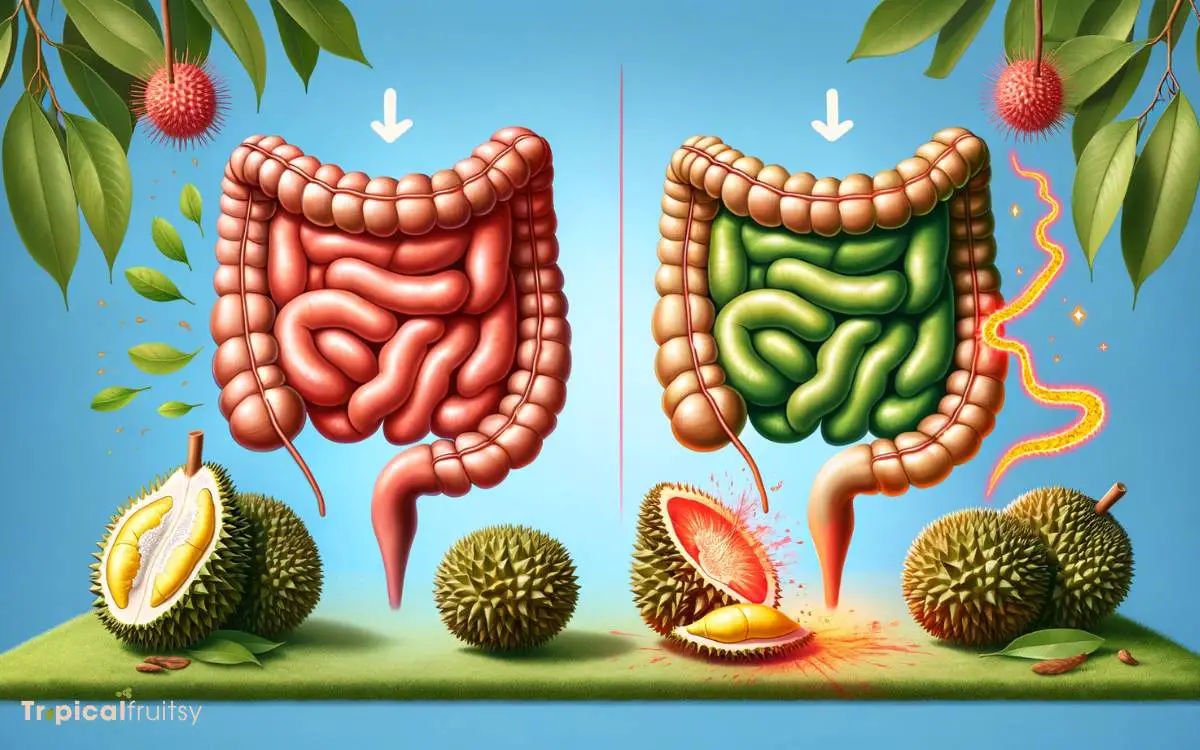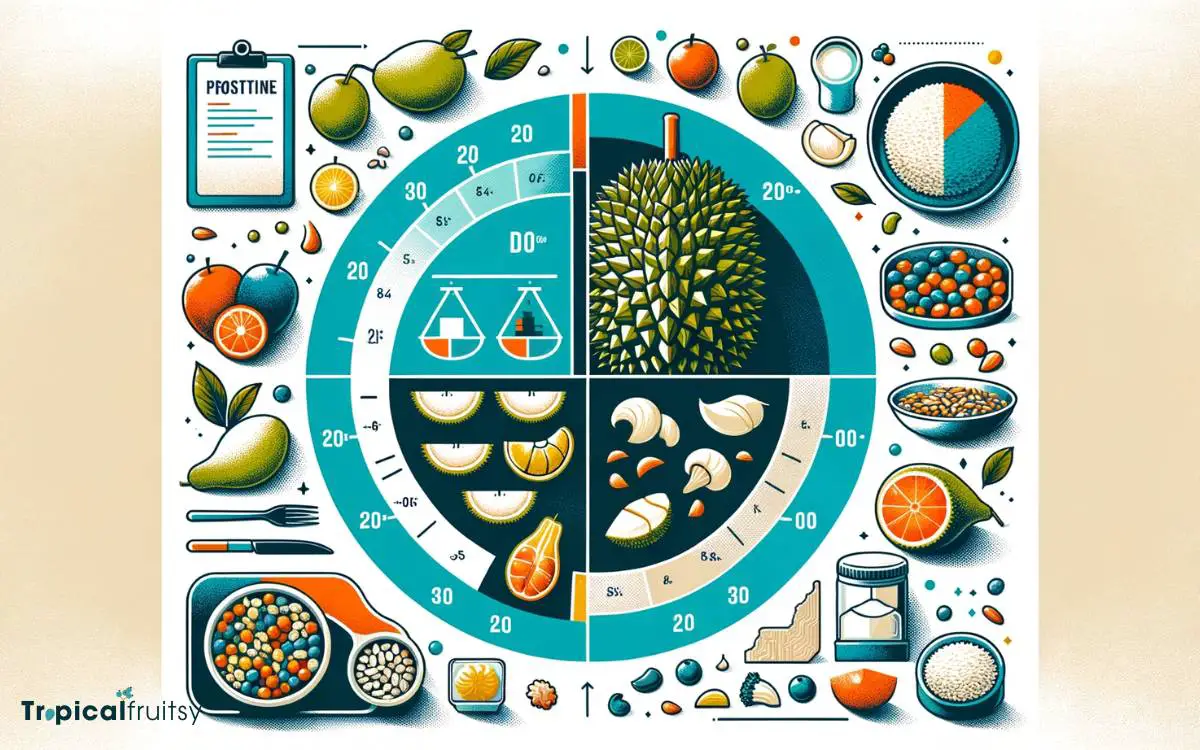Does Durian Make You Poop: Discover the Digestive Impact!
Durian, known for its high dietary fiber content, can indeed have a laxative effect and may stimulate bowel movements. The fruit’s fiber increases stool bulk and promotes regularity, which can be beneficial for digestion.
Dietary fiber is a key nutrient in durian that aids in digestion by helping to maintain bowel health and prevent constipation. Fiber absorbs water, which softens the stool and makes it easier to pass.
However, the impact of durian on bowel movements can vary among individuals, and overconsumption may lead to digestive discomfort for some people.
Enjoying durian in moderation can contribute to digestive regularity and provide a flavorful addition to a nutritious diet.

Key Takeaway
Nutritional Impact of Durian on Digestion & Bowel Movements
| Nutrient | Amount per Serving (100g of Durian) | Recommended Daily Intake | Effect on Digestion |
|---|---|---|---|
| Dietary Fiber | 3.8g | 25-30g | Promotes bowel regularity, prevents constipation |
| Vitamin C | 19.7mg | 65-90mg | Supports overall health |
| Potassium | 436mg | 2600-3400mg | Aids in muscle function, including digestive muscles |
| Fat | 5.33g | Varies based on diet | Higher in fat than most fruits, may affect digestion if consumed in large amounts |
| Sugars | 27.09g | No more than 10% of total daily calories | Can cause digestive upset in sensitive individuals when consumed in excess |
What Is Durian

The durian is a tropical fruit known for its distinctive odor, large size, and thorn-covered husk. It is botanically classified as Durio spp., within which several species fall, the most common being Durio zibethinus.
This fruit’s aroma is polarizing, often described as a mix of savory, sweet, and creamy notes, with a pungent background that some find unpleasant.
Nutritionally, durian is rich in carbohydrates, dietary fiber, and vitamins, particularly vitamin C and B-complex groups. It also contains various minerals like potassium, iron, and magnesium.
The high fiber content in durian is of particular interest in the context of digestive health, suggesting a potential influence on bowel movements, which warrants a closer examination of its gastroenterological effects.
Nutritional Profile Overview

The nutritional composition of durian is significant for its high dietary fiber content, which is a critical factor in promoting regular bowel movements and overall gastrointestinal health.
Additionally, durian contains a variety of vitamins, particularly high levels of vitamin C and B-complex vitamins, which play essential roles in various metabolic processes.
An analysis of these nutrients is imperative in understanding how durian consumption may affect digestive function.
Fiber Content
We should consider that durian, known for its distinctive smell and taste, also contains a significant amount of dietary fiber, an essential component that can influence bowel movements.
Fiber is crucial for maintaining a healthy digestive system by adding bulk to the stool and promoting regularity.
The consumption of fiber-rich foods like durian may enhance bowel function and can be an integral part of a diet for those seeking to alleviate constipation.
| Nutrient | Amount per Serving (100g) | % Daily Value* |
|---|---|---|
| Calories | 147 | 7% |
| Total Fat | 5g | 8% |
| Dietary Fiber | 3g | 12% |
Percent Daily Values are based on a 2,000 calorie diet. Your daily values may be higher or lower depending on your calorie needs.
Key Vitamins Present
Beyond its fiber content, durian is also a rich source of several key vitamins that contribute to overall health and digestion.
Notably, durian provides a significant amount of vitamin C, crucial for immune function and collagen synthesis.
It is also rich in B vitamins, including thiamin (B1), riboflavin (B2), niacin (B3), pantothenic acid (B5), and vitamin B6, which are vital for energy metabolism and neurological function.
Additionally, the presence of vitamin A in durian supports visual health and skin integrity. These vitamins, together with dietary fiber, facilitate gastrointestinal motility, potentially promoting bowel movements.
The nutritional synergy inherent in durian underscores its role as a multifaceted food that supports various aspects of physiological well-being, including digestive health.
Fiber Content in Durian

While durian is often recognized for its distinctive smell and taste, it is also a rich source of dietary fiber, which contributes to its laxative properties and may influence bowel movements.
The fiber content in durian plays a critical role in maintaining healthy digestive function. Dietary fiber, which encompasses both soluble and insoluble types, aids in increasing stool bulk and softening it, thereby facilitating smoother bowel transitions.
Clinically, a high-fiber diet is associated with a lower risk of constipation and other gastrointestinal issues.
The presence of fiber in durian also helps in promoting a sense of satiety, potentially contributing to weight management.
Analyzing the fiber concentration in durians, it is evident that consuming this fruit can be beneficial for digestive health, provided it is integrated into a balanced diet.
Digestive Benefits of Fiber

Dietary fiber, a fundamental component of durian, offers numerous digestive advantages, including improved bowel regularity and reduced risk of digestive tract diseases.
The indigestible nature of fiber aids in the formation of stool, promoting its passage through the digestive tract and facilitating regular defecation. This action helps to prevent constipation, a common gastrointestinal issue.
Additionally, a diet rich in fiber is associated with a decreased risk of developing colorectal cancer.
The clinical benefits of dietary fiber include:
- Enhanced stool bulk and consistency, easing bowel movements
- Reduction in the incidence of constipation
- Lowered risk of colorectal cancer development
- Stabilization of blood glucose levels by slowing digestion
- Promotion of a healthy gut microbiota, supporting overall gastrointestinal health
These attributes underscore fiber’s pivotal role in maintaining digestive health.
Durian and Bowel Movements

Given that durian is high in dietary fiber, its consumption can significantly influence bowel movements, often leading to an increase in stool frequency and improvement in stool consistency.
The presence of fiber in the diet facilitates the passage of material through the digestive system and increases stool bulk, which can be particularly beneficial for individuals experiencing constipation.
The fiber in durian acts as a prebiotic, promoting the growth of beneficial gut bacteria, which is vital for maintaining a healthy digestive ecosystem.
While durian’s fiber content supports digestive health, individual tolerance varies, and excessive consumption may lead to gastrointestinal discomfort in some people.
Understanding the balance and effects of durian on one’s personal digestive system is essential. This leads us to consider individual digestive responses to durian consumption.
Personal Digestive Responses

Examining individual digestive responses to durian reveals a spectrum of effects, ranging from mild laxative properties to potential discomfort for certain consumers.
Personal gastrointestinal tolerance to durian can vary widely, influenced by factors such as:
- Enzymatic makeup and gut flora diversity
- Pre-existing digestive conditions (e.g., irritable bowel syndrome)
- Quantity of durian consumed in a sitting
- Hydration levels, as fiber requires adequate water to aid digestion
- Frequency of durian intake and regularity in diet
These variables contribute to the complexity of predicting durian’s effect on bowel movements.
Clinically, it is acknowledged that while durian’s high dietary fiber content can stimulate peristalsis, leading to increased stool frequency for some, others may experience adverse reactions such as bloating or cramping, underscoring the importance of individual dietary awareness and moderation.
Potential Laxative Effects

The high fiber content in durian has a recognized potential to act as a natural laxative, which may facilitate bowel movements for some individuals.
Fiber is essential for the health of the digestive system, promoting regularity and preventing constipation.
When ingested, fiber adds bulk and softness to stool, which can help to stimulate the peristaltic movements of the intestines, thereby aiding in the elimination process.
| Nutrient | Function | Relation to Laxative Effect |
|---|---|---|
| Fiber | Adds bulk to stool | Facilitates easier passage |
| Water | Softens stool | Reduces strain during bowel movements |
| Potassium | Regulates fluid balance | Aids in preventing constipation |
| Magnesium | Muscle relaxation | May ease intestinal movements |
| Sugars | Draws water into intestine | Can speed up bowel transit |
An evidence-based approach would recommend durian consumption as part of a balanced diet to potentially help maintain regular bowel function.
However, individual responses may vary, and overconsumption may lead to gastrointestinal discomfort.
Moderation and Dietary Balance

When considering the consumption of durian, portion control is essential to prevent gastrointestinal distress and ensure optimal digestive function.
A balanced nutritional intake that includes a variety of foods is important to mitigate the potential laxative effects of durian and maintain overall health.
Overconsumption of durian can lead to negative health outcomes, underscoring the need for dietary moderation.
Portion Control Importance
Why is portion control crucial when consuming durian to maintain dietary balance and prevent digestive discomfort?
Durian, known for its rich content of dietary fiber and high caloric density, can lead to gastrointestinal issues if consumed in excessive quantities.
Portion control is essential for several clinically supported reasons:
- Preventing Overconsumption: Durian is calorie-dense; moderate portions can help maintain a healthy weight.
- Reducing Gastrointestinal Stress: High fiber intake can be beneficial, but overindulgence may cause bloating and gas.
- Balancing Nutrients: Eating durian in moderation ensures room for other foods in the diet.
- Regulating Blood Sugar: Durian has a high glycemic index, so controlled portions are vital for blood sugar management.
- Minimizing Adverse Reactions: Some individuals may experience discomfort or allergic reactions to durian.
Understanding portion control with durian paves the way for discussing balanced nutritional intake.
Balanced Nutritional Intake
Incorporating durian into a diet with moderation ensures a balanced nutritional intake, preventing the potential for excessive fiber to disrupt normal bowel movements.
The durian fruit offers a significant amount of dietary fiber, which is essential for maintaining healthy digestive function. However, a clinical approach to nutrition emphasizes the importance of balance.
Consuming durian within the context of a varied and balanced diet allows individuals to benefit from its nutritional contributions, including vitamins, minerals, and antioxidants, without overwhelming the gastrointestinal system.
Careful integration of durian into one’s dietary regimen supports the alimentary tract’s requirements for optimal performance.
Excessive Consumption Effects
Durian’s high fiber content, when consumed in excessive amounts, can lead to digestive issues, including increased bowel movements and potential gastrointestinal discomfort.
Overindulgence in durian, like any high-fiber food, can upset the balance within the digestive tract, leading to a range of symptoms. Moderation is key to avoid these adverse effects.
The potential consequences of excessive durian consumption include:
- Diarrhea or loose stools due to overstimulation of bowel movements
- Abdominal bloating and gas as a result of excessive fiber fermentation
- Nausea or vomiting from overeating due to its rich and indulgent nature
- Caloric overload, contributing to unwanted weight gain
- Nutrient imbalances, if durian displaces other foods in the diet
An evidence-based approach recommends incorporating durian into a diet with a variety of foods to maintain gastrointestinal health and overall well-being.
Conclusion
Durian, the ‘king of fruits’, while divisive in aroma, reigns supreme in its dietary fiber content, offering considerable digestive benefits.
Its fibrous nature can promote regular bowel movements and may exhibit laxative properties for some individuals.
However, its consumption should be tempered to maintain dietary equilibrium. As with all foods, the key lies in moderation, ensuring that this tropical delicacy enhances gastrointestinal health without overwhelming the body’s balanced symphony of nutrition.






